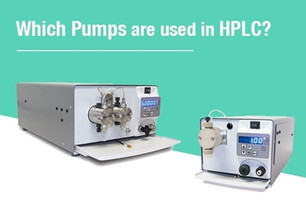Posted by Chrom Tech on 15th Oct 2025
Which Pumps Are Used in HPLC?
High-performance liquid chromatography (HPLC) relies on precision pumping systems to deliver solvents at a consistent, controlled flow rate and pressure. The right pump type ensures accurate separations, reproducible results, and efficient method development. Below, we’ll explore the different types of HPLC pumps, how they work, and their benefits across applications.
Why High Pressure in HPLC?
Over the years, chromatography has evolved toward smaller particle sizes in HPLC columns to achieve faster and higher-resolution separations. In the 1990s, 5 µm columns were standard. Soon after, scientists adopted 3.5 µm and smaller particles to improve efficiency—resulting in higher backpressure on the system. Fortunately, HPLC pumps advanced alongside column technology to meet these demands.
Traditional pumps operated up to 6,000 psi (400 bar), but today’s systems often require much more. The advent of sub-2 µm columns created the need for ultra-high-pressure pumps capable of withstanding up to 18,000 psi (1,200 bar). This move toward higher pressures supports the industry’s drive for faster, more efficient analyses.
Types of HPLC Pumps
Binary Pumps
Binary pumps—currently the most popular configuration—use two high-pressure pumps to form a solvent gradient. Typically, Solvent A is aqueous or buffered, and Solvent B is an organic solvent such as acetonitrile or methanol. High-pressure mixing enables rapid gradient response and excellent reproducibility, making binary systems ideal for most reversed-phase HPLC applications.
Quaternary Pumps
Quaternary pumps can mix up to four solvents at low pressure to form more complex gradients. Because they mix before pressurization, they require efficient degassing systems. While low-pressure mixing introduces slight gradient delays, quaternary pumps offer exceptional flexibility for method development and routine analysis that involves multiple solvents.
Isocratic Pumps
Isocratic pumps deliver a single-solvent composition throughout the run. They’re often used in straightforward separations, metering, and fluid transfer applications. For high-performance chromatography, a dual-piston isocratic pump is preferred to maintain smooth, pulse-free flow at consistent pressure.
Dual-Piston vs. Single-Piston Isocratic Pumps
Dual-Piston Design
Dual-piston pumps operate two pistons 180° out of phase to generate continuous, smooth flow. This design minimizes pulsation and maintains precise volumetric delivery even under high pressure. The result is exceptional flow accuracy, which is critical for reproducible chromatographic performance.
Single-Piston Design
Single-piston pumps offer an economical solution for metering and general dispensing applications. These pumps feature a rapid-refill mechanism and may include a pulse dampener to reduce flow variation. While less precise than dual-piston systems, they are suitable for lower-demand applications and continuous liquid delivery.
Benefits of Using HPLC Pumps
- Consistent, Smooth Flow: Delivers near-pulse-free performance, maintaining accurate pressure and retention times even as system resistance changes.
- Precision and Reproducibility: Stable flow rates ensure high analytical reproducibility across multiple runs.
- User-Friendly Design: Many standalone pumps feature intuitive interfaces and easy solvent control for quick setup and operation.
- Gradient Control: Enables precise solvent mixing and gradient programming for advanced separations.
- Versatility: Suitable not only for chromatography but also for metering, chemical dosing, and reaction feed control.
Liquids Handled by HPLC Pumps
Modern HPLC pumps are engineered to accommodate a wide range of liquids, including:
- Water-based buffers for reversed-phase and ion-exchange chromatography.
- Organic solvents such as acetonitrile, methanol, and isopropanol.
- Viscous or nonpolar fluids requiring controlled metering.
- Corrosive or reactive chemicals using specialized materials for compatibility.
- Radioactive or biohazardous liquids for analytical and medical research.
- Salt solutions used in environmental and process monitoring applications.
Industry Applications for HPLC Pumps
HPLC pumps are used across many fields due to their precision and adaptability:
- Pharmaceuticals: Drug development, quality assurance, and active ingredient quantification.
- Biotechnology: Protein purification and peptide analysis.
- Food and Beverage: Contaminant detection and nutrient verification.
- Environmental Testing: Monitoring pollutants in water, soil, and air samples.
- Chemical Manufacturing: Process control, synthesis, and purity validation.
- Clinical Diagnostics: Biomarker and blood component analysis.
Wetted Flow Path Materials in Chrom Tech Pumps
Chrom Tech’s HPLC pumps are available in a variety of wetted path materials tailored to specific analytical environments. Standard options include:
- Stainless Steel: The most common choice for its strength, pressure tolerance, and corrosion resistance.
- PEEK: Ideal for bio-applications and use with solvents that are incompatible with metals.
- Fluoropolymers and UHMWPE: Enhance chemical resistance for aggressive solvents.
- Synthetic Ruby and Sapphire Components: Provide durability and precise piston movement in high-pressure systems.
Chrom Tech offers isocratic, binary, and quaternary HPLC pumps to meet any lab’s requirements. Whether you need a cost-effective standalone pump or an advanced high-pressure system, our technical team can help you identify the right configuration for your workflow.
Frequently Asked Questions About HPLC Pumps
What pressure range do modern HPLC pumps support?
Standard HPLC pumps operate up to 6,000 psi, while ultra-high-pressure pumps (UHPLC) can reach 18,000 psi for sub-2 µm particle columns.
What’s the difference between binary and quaternary pumps?
Binary pumps mix two solvents at high pressure for rapid gradient formation, while quaternary pumps mix up to four solvents at low pressure, offering greater flexibility but slower response times.
When should I choose a dual-piston pump?
Choose a dual-piston design for analytical HPLC applications that require smooth, pulse-free flow and consistent retention times. Single-piston pumps are better suited for metering or transfer applications.

